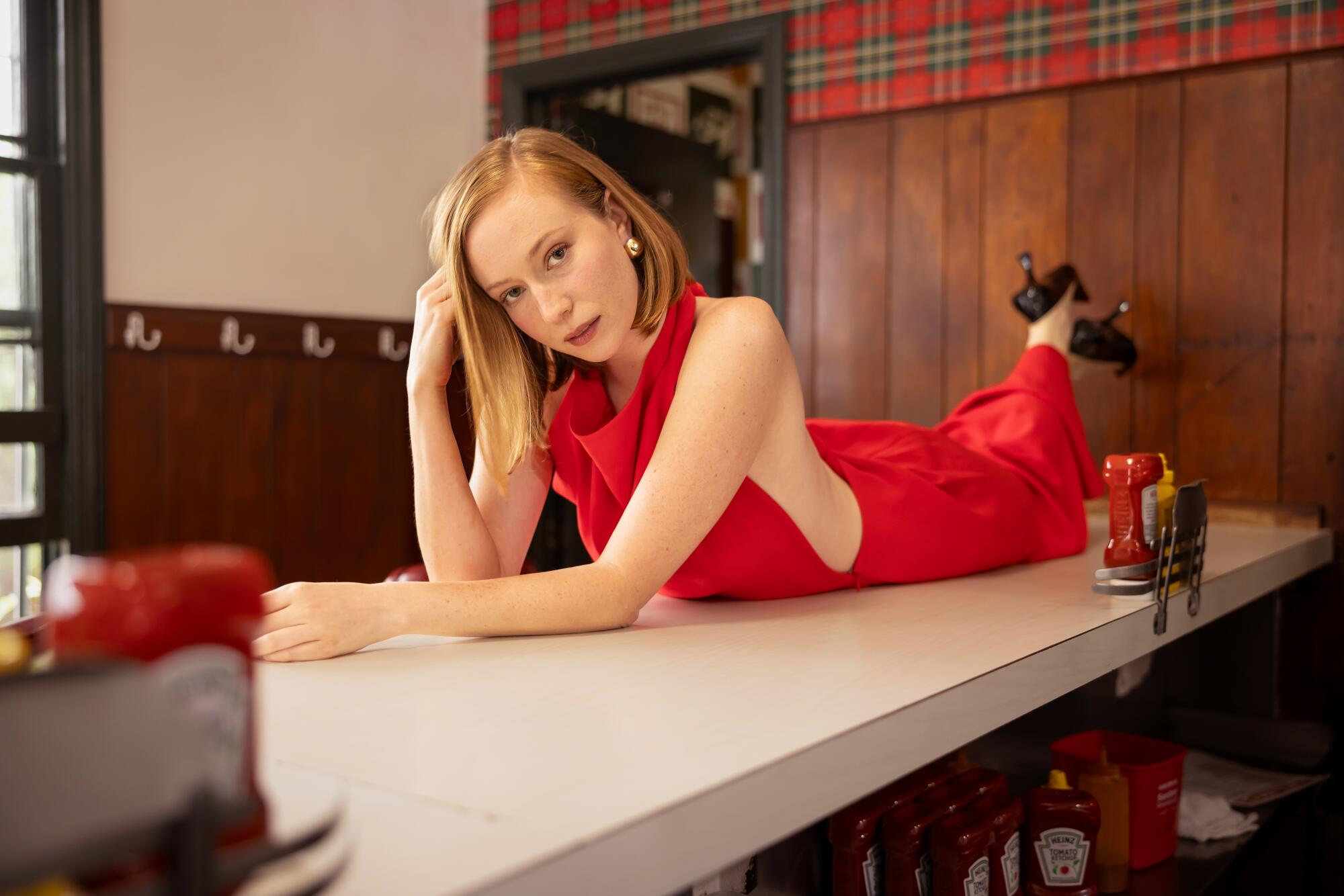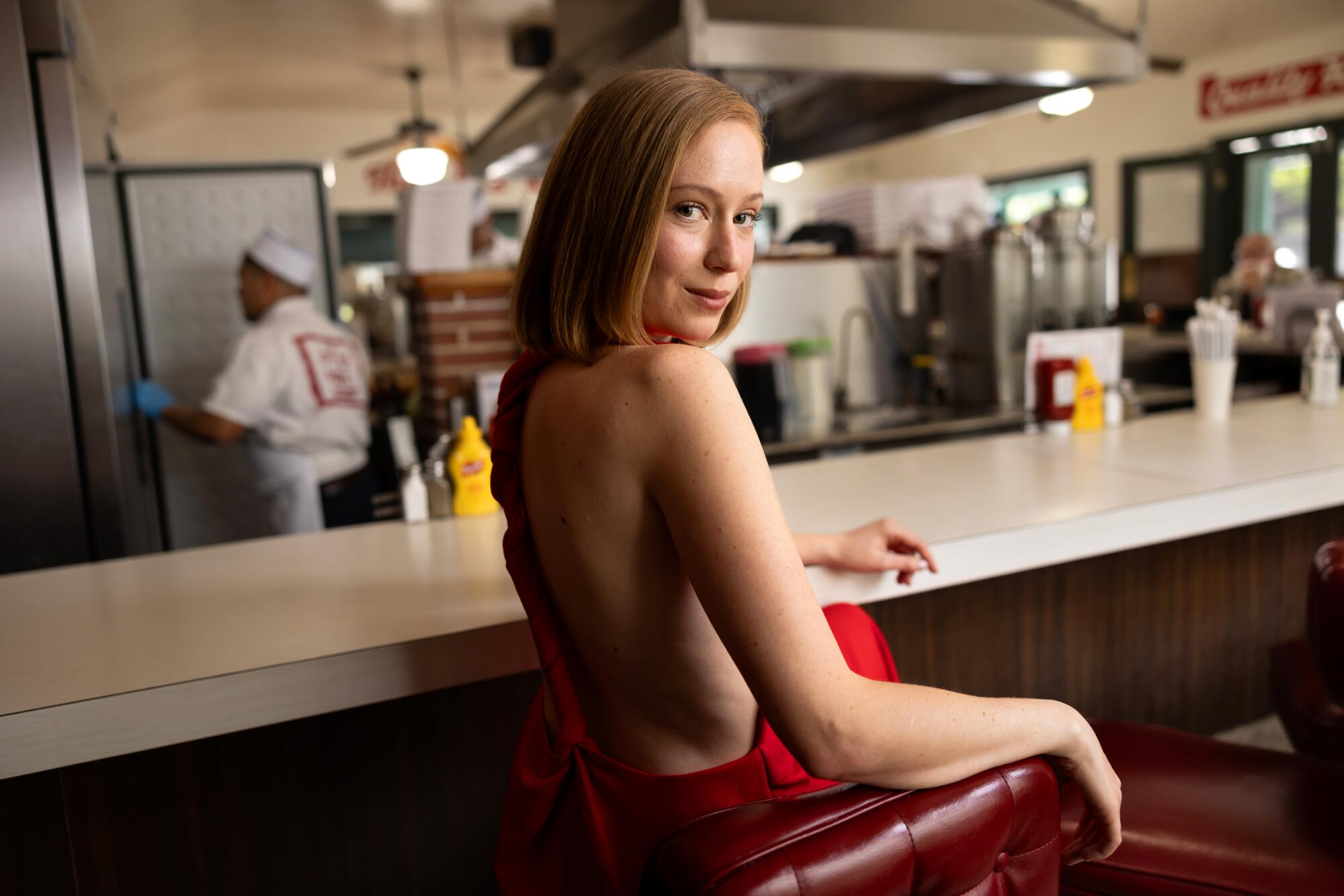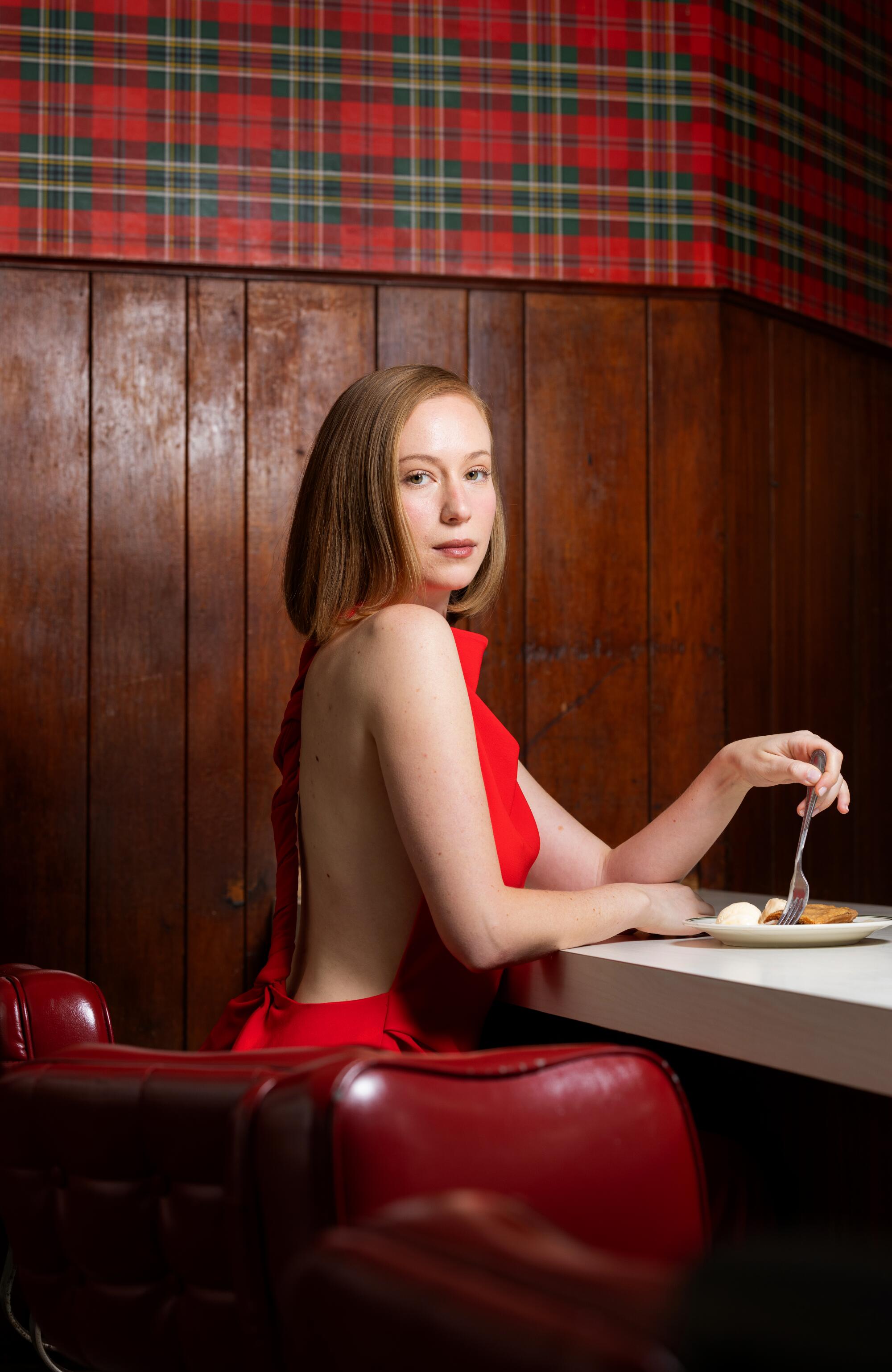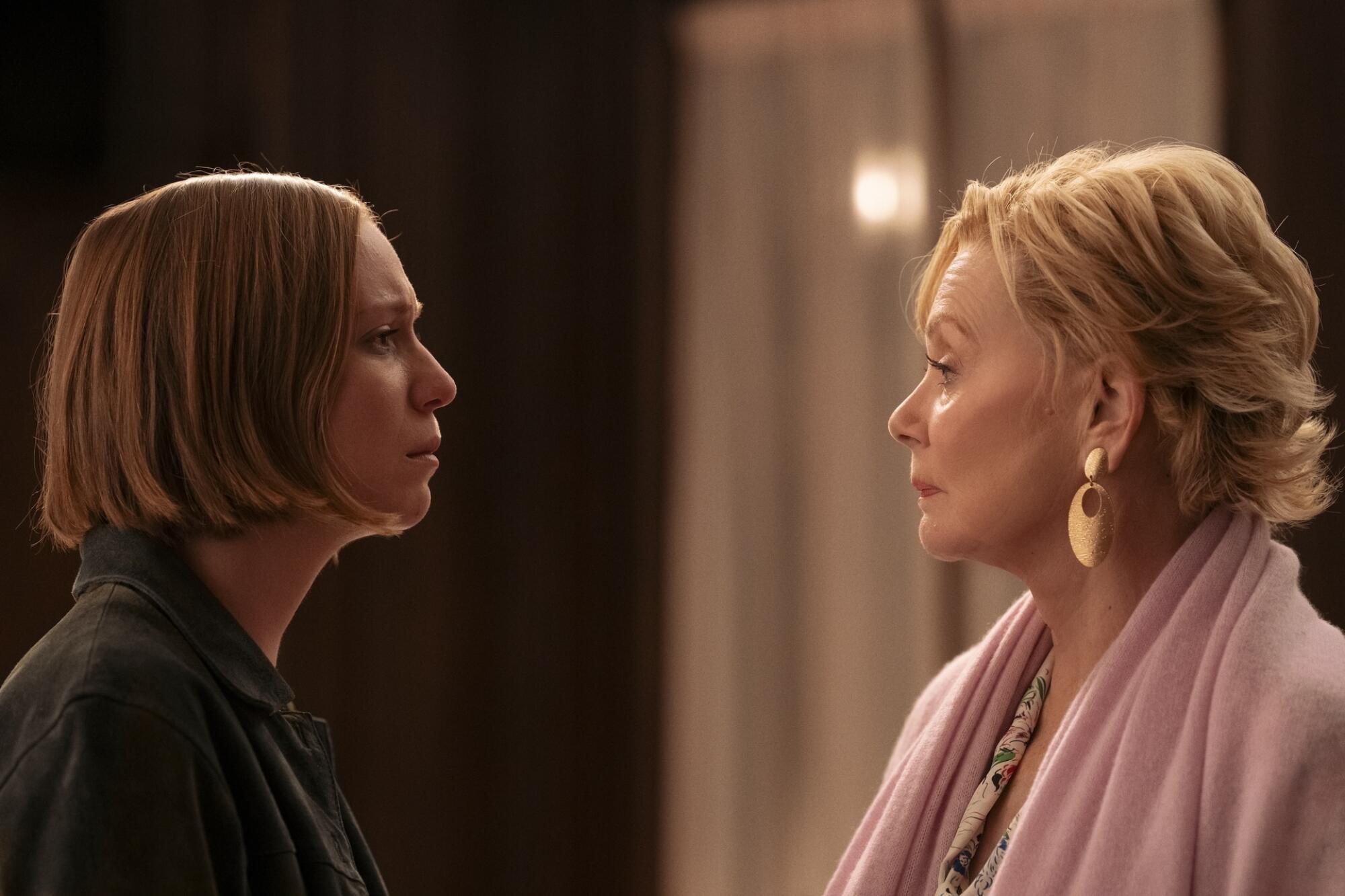When I told Hannah Einbinder at the start of our interview that I had seen her new comedy special, “Everything Must Go,” a look somewhere between terror and elation crossed her face, which momentarily turned bright red.
“It feels like the most intimate extension of myself, being and soul that I am sharing,” she said when I asked what she was feeling. “So to hear you say that you’ve seen it is the first time I’ve heard someone say that they have seen it. It filled me with joy and excitement and anticipation and a little shock.”
At 29, she described the hour, premiering June 13 on Max, as her “very short” life’s work. “So,” she said, launching into a sarcastic tone, “no presh. It’s casual.”
Einbinder became known to audiences as the overworked comedy writer and underling Ava Daniels on “Hacks,” the Max series starring Jean Smart, which just wrapped up its third and most acclaimed season to date. However, stand-up has long been her main artistic passion and pursuit.
She remembers the exact date of her first open mic in Los Angeles — Jan. 3, 2018, at the Silverlake Lounge — and she considers this special the culmination of her entire time doing stand-up. It’s an hour that’s both deeply personal and couched in a performance style she has carefully crafted. She wears a sleek, all-black look and an expertly cut bob, but she uses her body to both bare her innermost feelings and to become various characters ranging from a witch-like hypnotist to planet Earth embodied as Marisa Tomei in “My Cousin Vinny,” who is angry at humanity for climate change. Einbinder’s “greatest love is the natural world,” she said over Zoom, wearing a sweatshirt with the rolling paper icon the Zig-Zag Man.
Hannah Einbinder in her Max comedy special, “Everything Must Go.”
(Eddy Chen)
If you want to get to know Einbinder, the special, which opens with her birth and ends with her grandmother’s funeral, is a good place to start. It starts with a bit she has done before on camera, notably on “The Late Show With Stephen Colbert” in 2020, when she became the youngest comedian to ever perform on the show. She explains that many comics, when they start their set, begin by telling the audience “a little bit about me.” Her version of that is sultry, with a jazz score, the result of watching a lot of Turner Classic Movies at the time she wrote the gag. Everything she says is true. Her mother, Laraine Newman, one of the original “Saturday Night Live” cast members, had Einbinder when she was 42. Her parents did sperm selection with the hope that they would have a boy. But the way Einbinder delivers the material makes you question just how real it is.
“When I originally wrote that bit, and it is an older bit of mine, I was still at a place where I was trying to create a little bit of distance between myself and the audience,” she said.
Since then, she’s become much more comfortable being honest with the crowd. Sandy Honig, a comedian who directed the special and has toured with Einbinder, has seen her friend and collaborator grow since they first met about six years ago. “Just watching her really come into her own and love herself and be confident, it’s all you really want for someone you love,” Honig said.
The material in “Everything Must Go” covers Einbinder’s bisexuality, her Judaism, her passion for the environment and her period, in addition to different eras of her life, from her stoner days to her time as a competitive cheerleader. She describes the intensity of cheering and how it ruined her body, holding up the microphone to her knee so you can hear it crack like a “gambling addict juggling dice.” The sound is awful.

“Just watching her really come into her own and love herself and be confident, it’s all you really want for someone you love,” said Sandy Honig, Hannah Einbinder’s friend and director of her stand-up special.
(Christina House / Los Angeles Times)
Yes — perhaps surprisingly given her lack of pep — Einbinder was extremely serious about cheerleading, a result of having seen “Bring It On” at an impressionable age.
“It was a huge chunk of my life and it was my first real passion for performance,” she said, speaking in her typically deliberate fashion and explaining that she was a “flyer,” one who is held aloft. “I was very dedicated to perfection. I think my work ethic can be very, obviously to me at least, be attributed to my time as a cheerleader.”
Growing up, Einbinder competed in the sport throughout Los Angeles, including at Beverly Hills High School, which she attended. She still considers the city her home base. “I love being in my car,” she said. “I wish they made a scented candle of the 405, I’d light that s— up every day in my home. I love Los Angeles. It is a huge part of my identity.”
In fact, the beginning of “Everything Must Go” is a tribute to Einbinder’s love of driving and her romantic vision of Los Angeles. She pulls up to the El Rey Theatre in a vintage red Mercedes as a French tune plays in the background.
For this story, the photo shoot was held at beloved West L.A. burger joint the Apple Pan, one of her childhood favorites. I was confused by the location because in the special she identifies as vegan, but she explained that during the taping, she forgot to say the line she added about how she no longer adheres to that diet, a joke about her own hypocrisy. “That is my bad,” she said. “That’s on me.” She does believe in reducing meat consumption, but being vegan is not her choice anymore.

Hannah Einbinder said she considers L.A. her home base: “I love Los Angeles. It is a huge part of my identity.”
(Christina House / Los Angeles Times)
Einbinder grew up in Westwood where she was, in her words, an “ADHD child” who gravitated toward the comedy of Jim Carrey. “I had a lot of energy and I was very hyperactive,” she said. “There are many studies that examine the differences in ADHD between little boys and little girls, and I definitely fall on the little boy ADHD side of the spectrum. I was really rambunctious and really I think Jim Carrey’s physical style spoke to me and I kind of started to mimic him.”
These days, “Hacks” co-creators Jen Statsky, Lucia Aniello and Paul W. Downs compare her to Robin Williams, highlighting her ability to combine acting and character work with intimate revelations about herself in her stand-up.
She first tried stand-up in college at Chapman University, where she initially enrolled in the broadcast journalism program. She was doing improv but didn’t think comedy would be a path until comedian Nicole Byer came to Chapman and was looking for someone to open for her. Einbinder volunteered.
“That was when it became very clear to me,” she said. “I didn’t really view it as, ‘This is my career.’ I just maybe naively viewed it as like, ‘I’m obsessed with this and I’m going to pursue this and I can’t stop doing it.’”
After college she moved in with her mom, worked as a barista at the now-closed Alfred Tea Room on Melrose and started doing open mics. Newman was “brutally honest” in her opinions about her daughter’s chosen field, saying, in Einbinder’s telling, “Good luck, girl. It’s tough out there. Go off, girl, do your thing.”
Getting the role of Ava on “Hacks” not only raised Einbinder’s profile as an actor — it was her first time acting on television — but also boosted her stand-up career, allowing her to pursue it at a pace she wanted. Because of the fame the series brought, she could work out material while touring instead of trying to play the game of internet recognition that so many stand-ups do these days.
“It is never lost on me how fortunate I am and how much being on ‘Hacks’ has made it possible for me to take my time and not have to put my clips up on Instagram or TikTok and to be able to just go right to the road,” she said.

Hannah Einbinder, photographed at the Apple Pan, an L.A. burger joint that was a childhood favorite of hers, says she’s no longer a vegan.
(Christina House / Los Angeles Times)
Einbinder approaches acting with the same studied intensity she approaches stand-up. “She’s always been innately talented and had this thing inside her that is just so raw and you can’t teach it or learn it,” Statsky said. “But she also takes the job of being an actor on the show so seriously and she’s so prepared.”
Downs added that Einbinder has notebooks filled with preparation for her scenes. Still, her seriousness about the job hasn’t stopped her from befriending everyone on set. Downs said that he and his co-creators always joke that she is No. 2 on the call sheet but has the energy of a production assistant.
“She’s the kind of person who immediately makes friends with everybody on the crew and knows everything about everybody and hangs out with them and they’re buds,” her “Hacks” co-star Smart said.
That’s evident in how she brought the “Hacks” community along for her special, using cinematographer Adam Bricker as well as the crew of grips and electricians that worked the series. Smart remembered walking in to watch the taping and being greeted by the grips parked outside. Arranging the work for her “Hacks” co-workers was “textbook Hannah Einbinder,” Smart said.
“She fights for her people so hard in a way that I’ve never encountered with anybody else in this industry,” Honig said. In Honig’s case, it meant that Einbinder advocated for the director to receive a fair fee in order to make a healthcare minimum. Einbinder specifically wanted to “shout out to the artisans,” who quickly learned the lighting cues for her act so she and Honig could turn the set into a cinematic experience, where the stage transforms each time Einbinder takes on a different persona.
The ending of Season 3 of “Hacks” sets up new shades of Ava for Einbinder to play in the fourth season, which Max has already ordered. In the final moments of Season 3, Ava blackmails Smart’s Deborah Vance into letting her be the head writer on her new late-night talk show, after Deborah tells her it’s going to someone else.

Ava (Hannah Einbinder) and Deborah (Jean Smart) in the Season 3 finale of “Hacks.”
(Jake Giles Netter / Max)
Smart said that Einbinder made her cry while filming one of the season’s most intense scenes — the confrontation between Ava and Deborah, in which Ava reveals her heartbreak over not getting the job.
“She is up for the challenge no matter what it is that we throw at her,” Downs said. “Because she has deepened her understanding of the character and because it’s been three seasons now, we knew that we wanted the character to level up.”
But as for what’s next for Einbinder, she plans to use her privileged position to take her time and choose what’s right. Smart even said that Einbinder turned down a meeting with an unnamed director on a “big, big movie” because of ethical issues with the project.
“I just went crazy when she told me,” Smart said. “But that’s the kind of person she is and I have to respect that. She’s an extraordinarily principled and kind person.”
For her part, Einbinder said she is trying to remove herself from a “capitalist timeline” where artists are required to churn out material when they have a level of heat in their careers. She wants to take her time to workshop new material with an eye toward quality above all else.
“I have been given the incredible gift of being able to make art and to be a part of art for a living and I hope to maintain that level of quality,” she said. “Cut to me in a Shell Oil commercial.” I said I don’t see that happening. She added: “No, just kidding, folks.”


